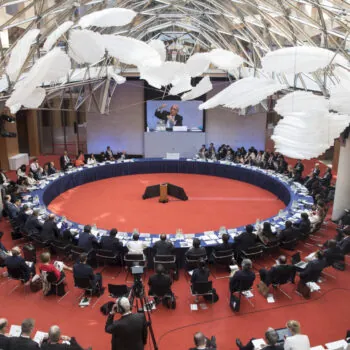To succeed in setting a long-term, strategic and sustainable direction for the UK’s infrastructure, it is vital that a series of fundamental principles be hard-wired into the design of the National Infrastructure Commission’s governance and operating model.
Independence in substance as well as form
Our consultation response highlights that the Commission’s governance and operating model must be independent of the political arm of Government and operate in the long-term public interest as distinct from the Government or party political interests.
Current proposals provide a degree of formal independence through the proposed establishment of the Commission in statute as a non-departmental public body (NDPB) but its substantive independence is open to question.
Under current proposals, the Chancellor will set the remit of the Commission through a formal letter on behalf of the Government at the beginning of every Parliament. The letter would provide the broad operational framework for the Commission: highlighting pressing objectives; setting the context for the National Infrastructure Assessment (NIA); and detailing the nature of the economic and fiscal remit. It is also proposed that the terms of reference for specific infrastructure studies (SISs) will be set by Government, which will define the issue to be addressed and provide the economic and fiscal guidance within which recommendations can be made.
Three problems with the proposed governance structure
The Commission’s remit and terms of reference provide a means by which infrastructure options can be pre-emptively foreclosed or mandated. If the ability to set these is restricted to the Chancellor, the Commission will be vulnerable to short-term political pressure.
The governance model risks restricting the Commission’s scope for evidence-based, objective judgments about what aspect(s) of UK infrastructure it should focus on. Without this ability, the Commission would be providing little more than expensive consultancy services to the Government.
It is still unclear how the fiscal and economic remit of the Commission can be set in a way which does not confine the Commission to prioritising the reduction of short-term costs over the delivery of long-term value, or of undercutting the role of independent economic regulators.
Recommendation: Enshrining the Commission’s fundamental principles in statute
The remit of the National Infrastructure Commission will be to identify the UK’s infrastructure needs over the next 10-30 years:
In the context of:
- the UK’s national laws and obligations, including those contained in the UK’s Climate Change Act 2008, the Warm Homes and Energy Conservation Act 2000 and devolution to cities and regions;
- the UK’s international commitments and obligations, including those contained in the Sustainable Development Goals, the COP21 Climate Change Agreement and the Aarhus Convention;
- European Union laws and obligations, including those contained in the EU Habitats Directive.
In order to:
- provide best long-term environmental, social and economic value to UK citizens;
- serve the best long-term public interest and well-being of UK citizens;
- provide a deliberative forum where politicians, experts, interest groups and representatives of local communities may engage in structured, informed discussions about policy options for infrastructure investment;
- go beyond project-by-project analysis of specific infrastructure investment proposals and provide a strategic systems-wide approach to building sustainable, resilient and best-value infrastructure;
- ensure all UK infrastructure is resilient to climate change impacts and growing global resource constraints.
With the requirement of:
- best-in-class standards of transparency;
- an undertaking that all methods and assumptions underpinning technical analysis, and the entirety of the evidence base used by the Commission, are made public and extensively discussed with relevant interested parties as part of a deliberative process to ensure that any conflicting views about data, methods, system boundaries and optimisations are resolved and do not undermine the quality of the debate or sustained consensus;
- exposing the Commission’s analysis and conclusions to public scrutiny before the advice to Government is finalised;
- ensuring adequate opportunity for public participation and allowing that feedback to be incorporated in findings must be central to the Commission’s processes. It must be active in finding those potentially interested in the Inquiry and all individuals and organisations who want to and can participate;
- the Commission having the power to undertake research on its own initiative to promote public understanding of the trade-offs involved in different policy approaches;
- all submissions and views expressed to the Commission being made public as soon as possible.
Improving accountability and scrutiny
The Commission must be held to account in a way that enhances rather than diminishes its substantive independence and which sets out clearly how Government will be held to account for its interactions with and response to the NIC’s recommendations.
Under current proposals, the NIC is a non-departmental body of Her Majesty’s Treasury and would be accountable to Government through HMT for its performance while at the same time being responsible for holding the Government to account. This arrangement appears tautological and could significantly negate the quality of accountability and scrutiny that the new model would achieve.
The current proposals also envisage a weak role for Parliament.
Recommendations to improve accountability and scrutiny
- Creating a parliamentary Joint Committee on Infrastructure (JCI) with a dedicated chair and members made up of the chairs of the relevant departmental select committees. The JCI would hold Government and the NIC to account and scrutinise all aspects of related work.
- The National Infrastructure Assessment and the Specific Infrastructure Studies should be laid before Parliament and scrutinised by the JCI.
- The NIC to update/review the analysis and recommendations made in the National Infrastructure Assessment within 3 years of it having being finalised.
- A clear role for the National Infrastructure Commission to hold the Government to account on the delivery, value and impact of UK infrastructure.


